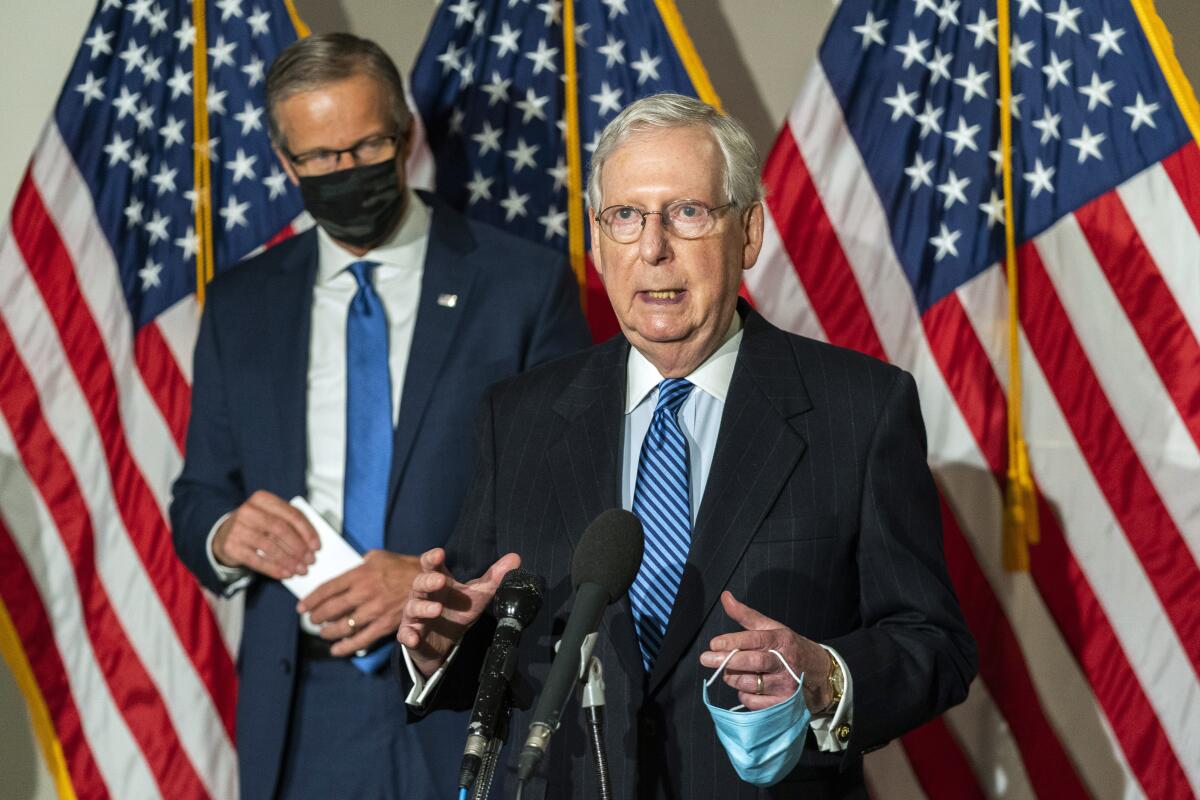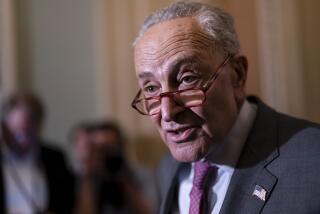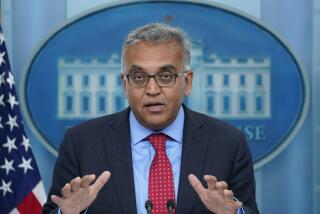A new coronavirus stimulus package looks unlikely until Biden administration

- Share via
WASHINGTON — Hopes that Congress would move swiftly after the election to provide more coronavirus relief for Americans are fading as Senate Republicans continue to resist large spending measures and pressure from President Trump to take action has waned.
That means as new COVID-19 cases surpass 130,000 nationwide each day, families and businesses are unlikely to receive another round of stimulus checks or enhanced unemployment benefits until next year, if at all.
Failure by lawmakers to address the health crisis and its economic fallout could portend the difficult road ahead for President-elect Joe Biden as he tries to get his agenda through what is expected to be a divided Congress.
While there is still a chance for a stimulus bill this year, the impasse means a COVID-19 relief package will almost certainly be a top priority for the new administration in early 2021.
Even then, Republicans could block the bill if they retain narrow control of the Senate after two runoff elections in Georgia on Jan 5.
The GOP’s opposition to spending more money is unlikely to change even with Trump out of office, in part because Republicans didn’t suffer any major electoral setbacks in Congress to suggest the public is clamoring for more stimulus funding.
A day after the election, Senate Majority Leader Mitch McConnell (R-Ky.) said a new relief plan was needed and voiced optimism that Congress might be able to address it once the political turmoil of the election has lifted.
But this week he was more dour, noting that the “snag that hung us up for months is still here,” a reference to skepticism among Senate Republicans about spending trillions of dollars on a plan.
“We need to think about — if we’re going to come up with a bipartisan package here — about what size is appropriate,” McConnell said. “I don’t think the current situation demands a multi-
trillion-dollar package.”
With only about half of the 22 million jobs lost from the pandemic shutdown having returned, the recovery still has a long way to go, and growth is now slowing as COVID-19 cases begin to reach levels never before seen in the United States.
Trump, who before the election publicly pushed Congress to pass a relief bill even larger than the $2.2 trillion that Democrats wanted, has largely moved on as he digs in on baseless claims of widespread election fraud and refuses to concede.
And Treasury Secretary Steven T. Mnuchin — once the top GOP cheerleader for a plan — stepped away from stimulus negotiations shortly before the election.
The Trump administration has indicated that it is ready to reengage in talks, but for now is leaving it in McConnell’s hands, with the understanding that the Senate leader plans to push for a smaller measure.
In October, McConnell proposed an approximately $500-billion bill that — unlike the Democrats’ version — included no new $1,200 checks for individuals. His bill offered assistance including enhanced unemployment payments and forgivable loans for some small businesses.
“While the administration would likely be engaged in working with Leader
McConnell in tailoring some of the details of the skinny package he intends to reintroduce, we are less likely to take the lead, unless there is consensus to scrap all existing proposals and start anew,” said a government
official familiar with the talks.
Some lawmakers agreed it was time for the Trump administration to step back and leave the negotiations to Congress.
“With no disrespect to Secretary Mnuchin — who I think has really worked hard to try to get a number of agreements, and it has been successful — I do think that it’s better if the members negotiate with members,” said Sen. Roy Blunt (R-Mo.). “And I’m glad to see [McConnell’s] decision that he’s going to step up and do our negotiating, and try to put a bill on the president’s desk that the president can sign.”
But since the election, there have been no new negotiations — or attempts at negotiation — between McConnell and Speaker Nancy Pelosi (D-San Francisco).
Pelosi and Senate Minority Leader Charles E. Schumer (D-N.Y.) say they won’t accept a piecemeal bill or anything as small as Republicans have proposed. They say GOP proposals don’t fully address the economic problems caused by the pandemic, let alone what is needed to combat the virus.
Pelosi said Friday the smaller GOP plan “doesn’t appeal to me at all because they still have not agreed to crush the virus. If you don’t crush the virus, we’re still going to have to be dealing with the consequences of the virus.”
Lame-duck sessions of Congress — the period when lawmakers who just survived or lost reelection return to Washington for work before the new Congress is sworn in in January — are notoriously difficult. The party that just won the White House typically wants to clear the table of problems for the incoming administration. But more often than not, no major policy gets done.
Even so, some opportunities remain to restart talks and pass a bill this year. Government funding runs out Dec. 11, and McConnell and Pelosi will be motivated to drive those negotiations to avoid another shutdown. Also, COVID-19 rates are climbing across the country as the nation heads into winter.
“You can’t ignore the fact that cases are spiking and hospitalizations are up,” said Ipsita Smolinski, managing director of Capitol Street, a health policy consulting firm.
Still, she predicted that if a deal is reached soon, “it will be narrow.”
Republicans feel confident that the economy doesn’t need substantial support, pointing to a better-than-expected October jobs report that found the unemployment rate had fallen to 6.9%.
Sen. John Kennedy (R-La.) said Pelosi was to blame for refusing to compromise and leaving Americans with nothing instead. “I’m hoping that the speaker will relent and allow us to enter into serious talks,” he said.
Democratic leaders could also face pressures within their ranks. In the House, moderate Democrats suffered surprising losses in the 2020 election, and may feel emboldened to demand that Pelosi agree to a smaller bill in order to pass something to address the pandemic.
But Democrats also complain that Republicans have refused to bend, noting they have already cut down the original Democratic plan from $3.4 trillion.
“Unfortunately the Senate and White House twiddled their thumbs and we essentially negotiated against ourselves,” said Rep. Ted Lieu (D-Torrance). “I have every expectation that the Senate can work with us on getting that package through. We’re not talking about a $3-trillion package.”
More to Read
Get the L.A. Times Politics newsletter
Deeply reported insights into legislation, politics and policy from Sacramento, Washington and beyond. In your inbox three times per week.
You may occasionally receive promotional content from the Los Angeles Times.











